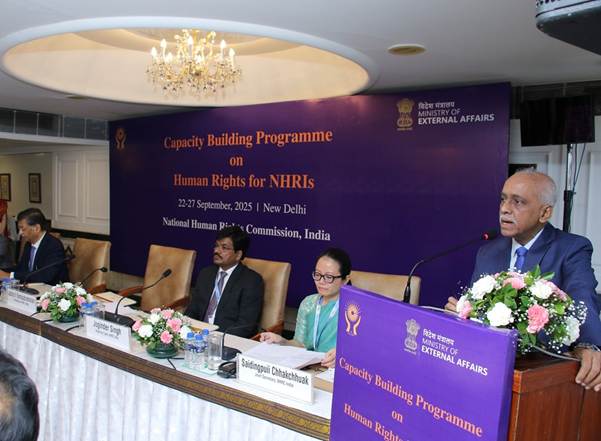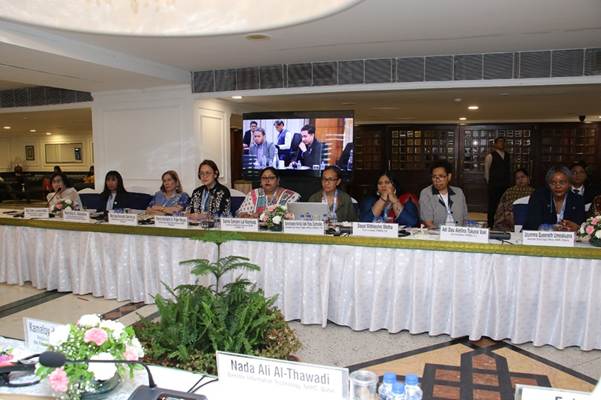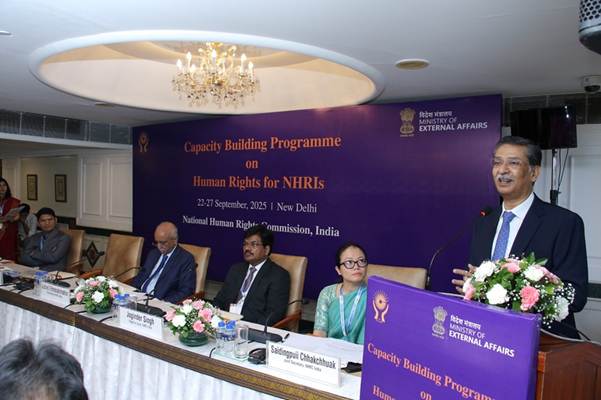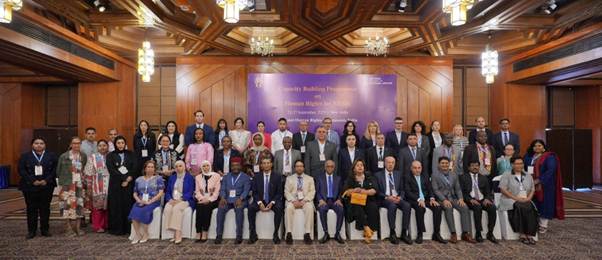National Human Rights Commission
NHRC, India’s ITEC Executive capacity-building programme on human rights in partnership with the MEA for senior functionaries of NHRIs of the Global South begins in New Delhi
Inaugurating it, NHRC, India Chairperson, Justice Shri V. Ramasubramanian says, strong human rights institutions work as a safety valve for public discontent
Highlights India’s rich diverse cultural ethos with various religious faiths, castes, languages, dialects and art forms; all thriving together in unity through shared traditions and values for centuries
NHRC, India Secretary General, Shri Bharat Lal calls upon the Global South to unite in advancing socio-economic and human development amidst various common challenges to secure collective well-being
43 senior-level functionaries from 12 NHRIs of Mauritius, Jordan, Georgia, Philippines, Qatar, Fiji, Uzbekistan, Bolivia, Nigeria, Mali, Morocco and Paraguay participate in the programme
Posted On:
22 SEP 2025 6:01PM by PIB Delhi
The six-day Indian Technical and Economic Cooperation (ITEC) Executive Capacity Building Programme on human rights for National Human Rights Institutions (NHRIs) of the Global South began in New Delhi today. The programme is being organised by the National Human Rights Commission (NHRC), India, in collaboration with the Ministry of External Affairs (MEA). It has brought together 43 senior-level functionaries from 12 NHRIs of Mauritius, Jordan, Georgia, Philippines, Qatar, Fiji, Uzbekistan, Bolivia, Nigeria, Mali, Morocco and Paraguay. Designed to strengthen the institutional capacities of NHRIs of the Global South, the programme underscores NHRC India’s commitment to fostering global dialogue on human rights, advancing South-South cooperation and promoting rights-based governance.

Inaugurating the programme, NHRC, India Chairperson, Justice Shri V. Ramasubramanian, reflected on the current global landscape. He observed that today’s world is marked by protests, anger, frustration, inequality, uncertainty and political unrest.
Citing an international think tank-Carnegie’s Global Protest Tracker Report, he noted that in the past year alone, more than a hundred protests erupted in various parts of the world, driven by factors such as anger, frustration, abuse of power, perceived government corruption and suppression of media. Between 2022 and 2025, protests even toppled governments in three of India’s neighbouring countries. He said that the significant point to note was that in countries where human rights institutions are very strong, such protests did not escalate into violence. These institutions act as safety valves for public discontent. Unfortunately, in some countries, human rights institutions are perceived as being anti-government, while they actually are people friendly.

Justice Ramasubramanian further highlighted India’s unique cultural diversity with its various religious faiths, castes, languages, dialects and art forms, all thriving together in unity through shared traditions and values. He also noted that Global South nations have rich traditions and unique experiences in addressing human rights issues. NHRC, India through ITEC Executive Capacity Building Programmes, seeks to provide a forum to learn together, share and grow together, in keeping with the spirit of the Vedic ethos of Vasudhaiva Kutumbakam i.e. the world as one family.
Earlier, in his opening remarks, NHRC, India Secretary General, Shri Bharat Lal, emphasised that human rights are always evolving and not static. He underlined India’s tradition of sharing knowledge and wisdom for the greater good of humanity. This training programme has been designed with the expectation of mutual learning on issues of common concern across the Global South. These challenges may span diverse areas from energy security and climate change to cyber security and emerging technologies like artificial intelligence. He called upon the Global South to unite in advancing socio-economic and human development to secure collective well-being and expressed the hope that the interactive sessions would help identify emerging challenges of global relevance.

Welcoming the participants, Shri Samir Kumar, Joint Secretary, NHRC, outlined the programme structure and interactive sessions to follow. The delegates expressed their gratitude and appreciated the role of NHRC, India in providing this opportunity for multilateral dialogue on global human rights issues. Smt. Saidingpui Chhakchhuak, Joint Secretary, NHRC delivered the vote of thanks.
The capacity-building programme will feature multiple sessions led by eminent national and international experts, offering the participants valuable insights into various dimensions of human rights as well as cultural and historical perspectives.

*****
NSK
(Release ID: 2169722)
Visitor Counter : 186